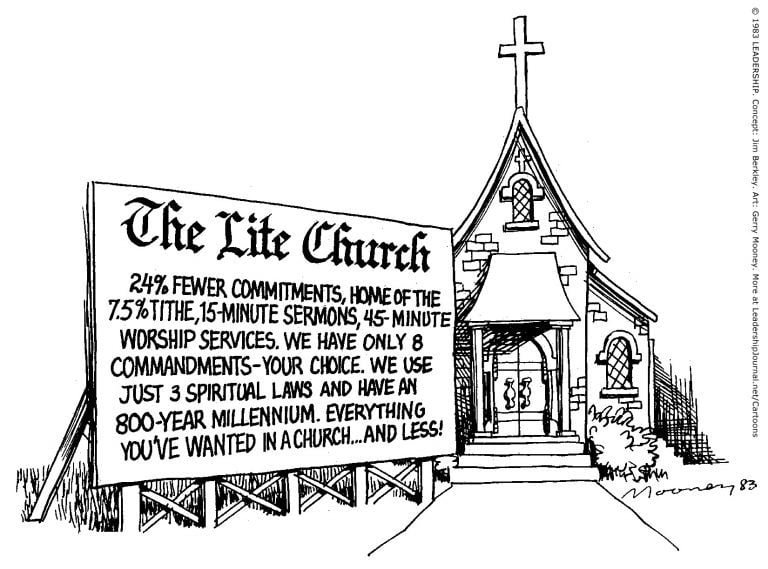
One common refrain often heard in some corners of the Evangelical world goes something like this: Praise God, I have NEVER changed my beliefs. I am seventy years old and I still have the exact same beliefs I had at age twenty — fifty years ago. There is this idea floating on the brackish backwaters of Evangelicalism that posits that change is bad or even sinful. Pastors and congregants pride themselves in having held to the one true faith their entire lives, that their Christology, soteriology, ecclesiology, eschatology, pneumatology, and hamartiology are the same yesterday, today, and forever. These theological purists will also say that their behavior hasn’t changed either. The sins they were against in the 1970s are the same sins they oppose today. These “just like a tree planted by the waters, I shall not be moved” Christians believe that they love what God loves and hate what God hates; that their interpretations of the sixty-six books of the inspired, inerrant, infallible Protestant Christian Bible align closely with God’s mind; that, thanks to the Holy Spirit living inside of them as their teacher and guide, they are spiritually mature people who feast on the meat of the Word of God, not the pablum most Christians slurp. (1 Corinthians 3:1-3 and Hebrews 5:11-13)
In most spheres of life, learning new things and discarding old beliefs, practices, and ideas is desired and expected. Not in Evangelicalism. Evangelicals cherish certainty. The Apostle Paul told young Timothy, the preacher in 2 Timothy 1:12, I KNOW in whom I have believed. Pastors challenge congregants to have a know-so salvation. Is it any wonder, then, that because a premium is placed on certainty, it breeds arrogance and leads people to think that their beliefs have never changed? Bruce, are Evangelicals who think this way glorying in ignorance? Yes, and the Bible gives them cover for their ignorance in Acts 4:13:
Now when they saw the boldness of Peter and John, and perceived that they were unlearned and ignorant men, they marvelled; and they took knowledge of them, that they had been with Jesus.
For Bible-believing Evangelicals, being considered unlearned and ignorant by the “world’ is a badge of honor. What Evangelical doesn’t want it said of them, they had been with Jesus?
Paul warns the church at Colossae in Colossians 2:8:
Beware lest any man spoil you through philosophy and vain deceit, after the tradition of men, after the rudiments of the world, and not after Christ.
Evangelicals are frequently warned by their pastors to beware of the philosophies, traditions, and rudiments of the world.
Better to be ignorant and know Jesus than to have a Ph.D. and go to Hell. Take that Bart Ehrman! A quick survey of Evangelicalism reveals all sorts of beliefs that lie deeply rooted in certainty-driven ignorance. Creationism, King James-Onlyism, Rapturism, and Landmarkism, to name a few, require adherents to deliberately and resolutely tune out any data that contradicts their beliefs. Science tells us that creationism is false. Evangelical solution? Ignore science, and by faith believe that what the Bible says in Genesis 1-3 is literally true. The same goes for King James-Onlyism, Rapturism, and Landmarkism. When Evangelicals holding these beliefs find themselves intellectually challenged, they run to the safety of faith, ignoring anything that shows their theological and historical beliefs are false. Charismatics and Pentecostals do the same. They KNOW that God works miracles, baptizes people in the Holy Ghost, and gives spirit-filled people the ability to do mighty works in Jesus’ name, including speaking in tongues. Believing that their interpretations of certain Bible passages are infallibly correct, these swing-from-the-chandelier Christians reject anything that suggests otherwise.
More than a few Evangelicals will object to what I have written here. While they will admit that there’s a lot of ignorance in Evangelical churches, their churches and pastors value intellectual pursuit. While this sounds good, when these claims are more closely examined, pseudo-intellectualism is often found. While these intellectual “giants” of the Evangelical faith do indeed read books and spend significant amounts of time studying — I know I did for most of the years I spent in the ministry — it is WHAT they read and study that is problematic. True intellectual inquiry requires following the path wherever it leads, leaving no stone unturned. Such inquiry requires people to meet truth head-on, not retreat or attempt to veer around intellectual obstacles. As a former Evangelical pastor of twenty-five years and now an atheist, I challenge Christians to carefully examine what they say they believe. Surely, any belief worth having can withstand scrutiny and investigation, right? Right? R-i-g-h-t?
Evidently not. When Evangelicals have doubts or find their beliefs challenged, what do they do? Many of them run to their pastors (indoctrination specialists) for encouragement and support. Keeping asses in the pews is crucial — no asses, no offerings — so when congregants come to them with questions and doubts, these so-called men of God will often recommend reading “safe” books written by Christian apologists or approved Christian authors. Some pastors, especially those who pride themselves in having three books in their library — Bible, concordance, and dictionary — will tell doubters to, by faith, cling to Jesus, read the Bible, and pray, reminding them that DOUBT is caused by Satan and his emissaries in the world. Here’s looking at you, Bruce.
Evangelicals who pride themselves in being “widely” read — commonly found among Evangelical Calvinists — do spend significant time studying and reading. It is what they read that is the problem. While these Evangelicals will, at times, venture beyond the safe confines of the Evangelical bubble, most of their reading and study is of authors considered orthodox. In other words, they only read books that reinforce their presently-held beliefs. While there is some lateral movement in Evangelicalism — Arminians becoming Calvinists, Baptists becoming Charismatics, Premillennialists becoming Amillennialists, Non-cessationists becoming Cessationists, and rigid, far-right-wing Fundamentalist Baptists becoming generic Evangelicals, most believers continue to hold on to the peculiar beliefs of their tribe, sect, or church. Their theological pursuits rarely, if ever, take them beyond the safety of their current beliefs and practices. Rare are Evangelicals who are willing to risk losing their faith in their search for truth.
Is it any wonder, then, that a premium is placed on being steadfast in the “faith once delivered to the saints” (Jude 1:3)? Revered are men and women whose theological roots run deep and who can always give an answer about the hope that lies within them (1 Peter 3:15). As an Evangelical pastor, I learned early that congregants wanted certainty. They wanted a pastor who firmly stood on the Word of God and had unmovable, unshakeable faith. If I had questions and doubts about this or that belief, church members didn’t want to hear about it. Tell us the unvarnished truth, Pastor Bruce. The reason, of course, for such desires is that many Evangelical church members have a borrowed belief system; that what their pastor believes is what they believe. Years ago, my theology shifted from the Baptist theology of the IFB church movement to Calvinism. As I began preaching expositionally and teaching congregants what Calvinists call the doctrines of grace, I was shocked by how few church members had a problem with the seismic changes in my theology and preaching. Looking back on this now, I have concluded that what mattered to members was having a sense of community and having a church family call home. Most of them were never going to read the books I did or spend hours a day studying the Bible. Unlike their pastor, who had a job where he was actually paid to read and study, they had secular jobs that demanded their time and attention. They also had families to care for. What congregants wanted most of all was assurance that they were on the right path; that what they believed squared with the Bible. They were willing to trust that what I said was true. After all, I was the man God had chosen to be their pastor. Surely God and his man had their best interests at heart, right?
I pity and feel sorry for Evangelicals who pride themselves in never changing their beliefs. Many Evangelicals are just like people who never travel far from home. They have never experienced the rich diversity that lies beyond their doorstep. Years ago, during my Independent Fundamentalist Baptist (IFB) days, a large group of new people showed up one Sunday to attend our morning service. I thought, at first, which nearby IFB church had a split? This group was not, however, disgruntled Baptists. They were Methodists. Once a year, their church canceled a Sunday service so attendees could visit a different church. Their pastor believed it was good for church members to be exposed to the heterogeneity found in Christianity. I thought, what an odd and dangerous thing to do — exposing members to potentially heretical teaching. Of course, I was glad they came to Somerset Baptist Church — The Fastest Growing Church in Perry County. God brought them my way so I could teach them the TRUTH. Why, some of these Methodists probably aren’t even saved, I thought at the time. If they were really, really saved, they wouldn’t be members of a liberal church. Later in life, I came to see how wise the Methodist pastor was; that attending a wide spectrum of churches is a cure for arrogant, self-assured Fundamentalism. The next-to-last church I pastored (for seven years) — Our Father’s House, West Unity, Ohio — used an advertising slogan that stated, The Church Where the Only Label That Matters is Christian. As its pastor, I was willing to embrace all those who claimed the name Christian — Baptists, Catholics, Episcopalians, Methodists, and Pentecostals, to name a few. The catholicity of Christianity was more important to me than theological orthodoxy.
I slowly came to realize that I didn’t know as much as I thought I did; that my theological underpinnings were just one of many ways of interpreting the Bible. I finally learned that I wasn’t infallible, and neither was the Bible. I suppose, had my experiences been different, my changed understanding of Christianity and faith might have led to mainline Christianity, liberalism, or Universalism. Instead, questions and doubts pushed me down the slippery slope Evangelical preachers warn about. Better to rest in certainty of belief and practice than end up like Bruce Gerencser, Evangelical pastors warn. Look at what happened to him! He is now, of all things, a God-hating, sin-loving atheist. I may, indeed, be a cautionary tale, but I am here to tell readers that a wild, woolly, wonderful world awaits those who will abandon certainty of belief and allow intellectual inquiry to lead the way. Life becomes about the journey instead of the destination. Will you join me? (Please read Gone but Not Forgotten: 22 Years Later San Antonio Calvinists Still Preaching Against Bruce Gerencser and Ralph Wingate Jr Uses Me as a Sermon Illustration.)
Bruce Gerencser, 66, lives in rural Northwest Ohio with his wife of 45 years. He and his wife have six grown children and thirteen grandchildren. Bruce pastored Evangelical churches for twenty-five years in Ohio, Texas, and Michigan. Bruce left the ministry in 2005, and in 2008 he left Christianity. Bruce is now a humanist and an atheist.
Connect with me on social media:
Your comments are welcome and appreciated. All first-time comments are moderated. Please read the commenting rules before commenting.
You can email Bruce via the Contact Form.











